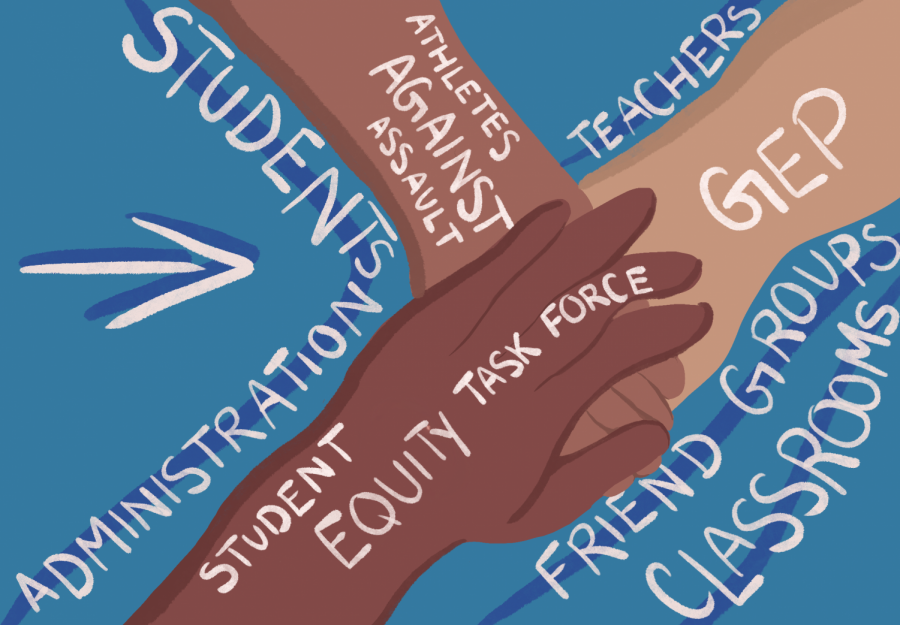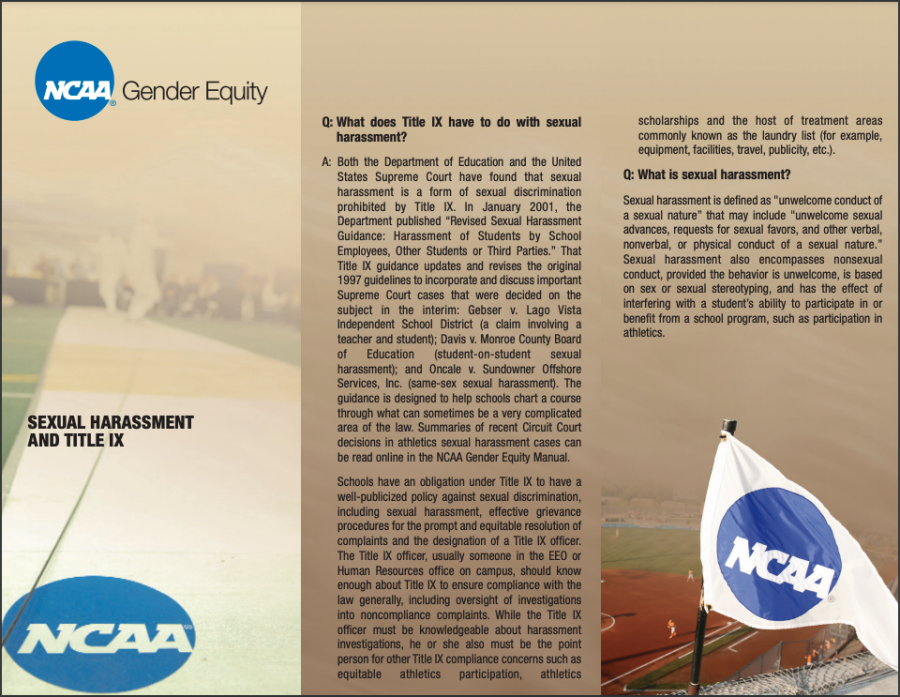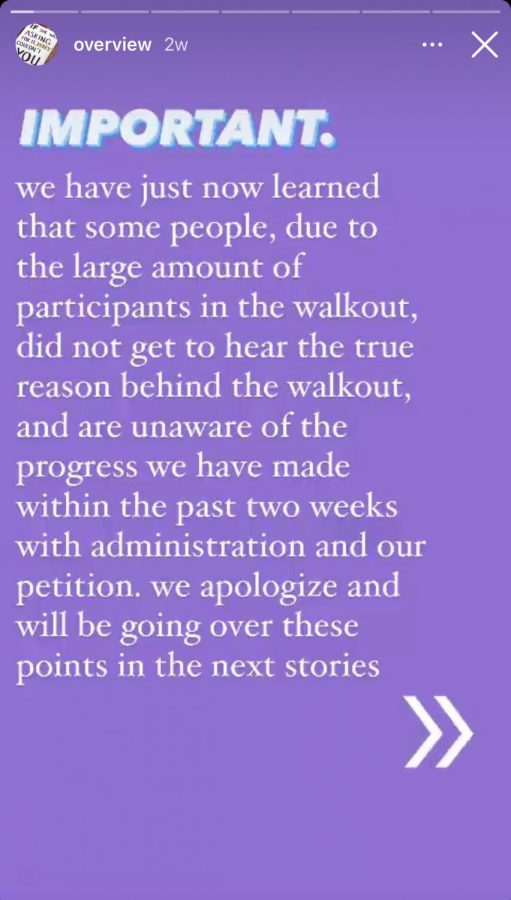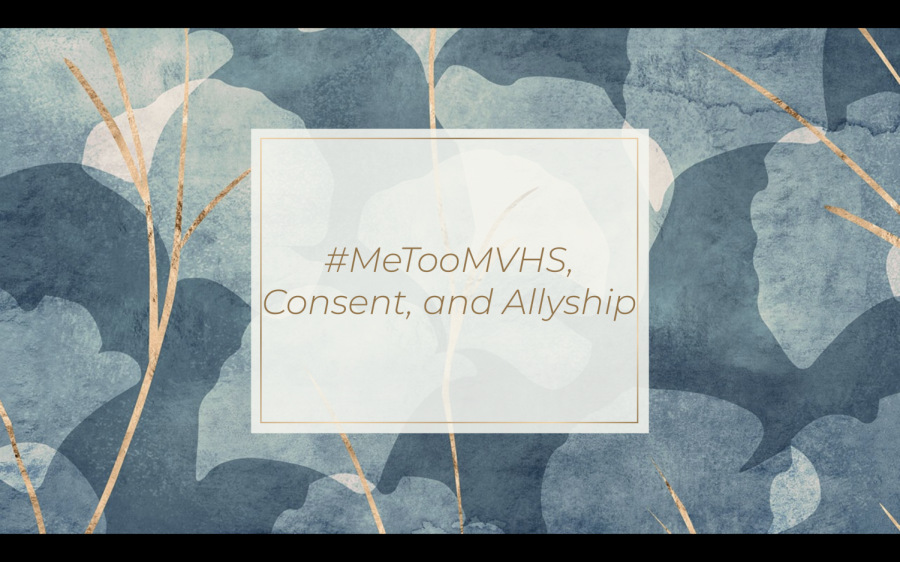Students, staff and administrators engage in and promote ways to support survivors after the recent surge in sexual misconduct allegations
The MVHS community works on sexual harassment and assault awareness and prevention initiatives
Students, staff and administrators engage in and promote ways to support survivors after the recent surge in sexual misconduct allegations
April 22, 2021
Starting in March, several students within the MVHS and FUHSD community began sharing their stories of sexual harassment and assault through social media. What began as a few posts soon gave rise to what many have been referring to as the #metoomvhs movement, as survivors and allies continue to advocate for justice and prevention.
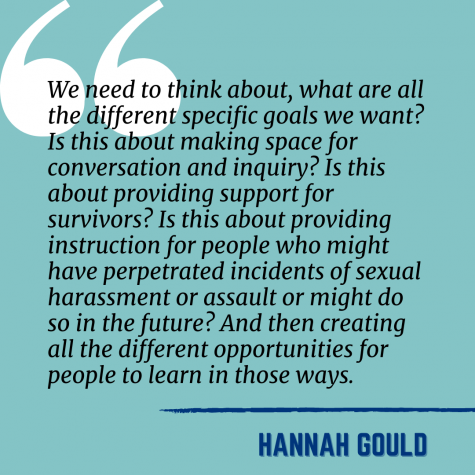
The movement has manifested in a variety of ways, including conversations within friend groups, families and classes. Many student-led groups have pursued initiatives such as the Girls Empowerment Club’s (GEP) feedback collection, the Athletes Against Assault group’s petition and the Student Equity Task Force’s plans to implement an Advisory lesson about consent. This story examines how teachers like English teacher Monica Jariwala and English and Theatre teacher Hannah Gould, among several other staff members, are advocating for systemic changes. In conjunction, Principal Ben Clausnitzer, Athletic Director Nick Bonacorsi and Associate Superintendent and FUHSD Title IX Coordinator Trudy Gross are looking to implement the student and staff feedback that they have recently received.
“We need to think about, what are all the different specific goals we want?” Gould, who also co-advises the Student Equity Task Force, said. “Is this about making space for conversation and inquiry? Is this about providing support for survivors? Is this about providing instruction for people who might have perpetrated incidents of sexual harassment or assault or might do so in the future? And then creating all the different opportunities for people to learn in those ways.”
Pre-#metoomvhs: Gross and GEP work to improve Title IX reporting accessibility
Senior and co-president of GEP Rachel Kim recalls that in December, Associate Superintendent and FUHSD Title IX Coordinator Trudy Gross reached out to Kim and her fellow co-president, senior Sachi Roy, asking for feedback about the district’s Title IX policy accessibility.
According to Kim, their conversation at the time resulted in implementing reforms such as “putting out more information about interim measures for Title IX procedures, and also being more transparent about what happens [in terms of] consequences.”
The changes included linking out to the Title IX and Gender Equity webpage on the portals on each of the five FUHSD high school’s websites; previously, the information was only linked on the district website. They also updated the FUHSD’s Frequently Asked Questions page on the district website by adding answers to questions regarding the corrective actions the school may take in order to ensure that survivors feel comfortable attending school.
Responses from MVHS Principal Ben Clausnitzer and MVHS Leadership
As allegations began to surface and get reported to administration during late March, Principal Ben Clausnitzer sent out emails on March 23 informing the community that an investigation has been started “of a sexual assault involving a Monta Vista student being shared on a social media account.”
Clausnitzer sent a followup email on March 26, where he shared Gross’ email (trudy_gross@fuhsd.org) and linked out to the Wellness Check-In form, the FUHSD Youth Resource Card, the FUHSD Title IX and Gender Equity webpage, the Reporting Sexual Harassment FUHSD poster and El Estoque’s coverage.
“There’s obviously, us as a school responding and saying ‘we’re not going to sweep things under the rug’ or hide when things occur that shouldn’t have occured,” Clausnitzer said. “We’re going to notify our school community.”
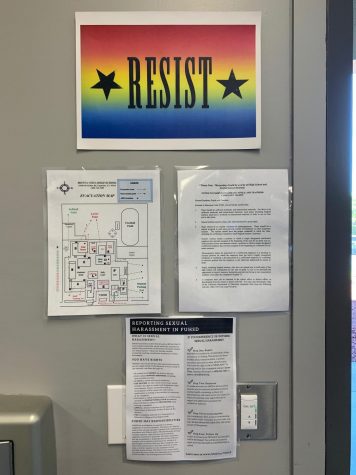
Clausnitzer says that these issues need to be addressed from multiple different places, including the “classroom level, school level and the family and community levels.” He points to systems already in place such as the consent unit in Sex Ed., English teacher Monica Jariwala’s consent curriculum in her AVID 11 and AVID 12 classes and the recent SAFER Choices Assembly from the Center of Respect, which he says they may continue or switch out next year, depending on feedback.
Clausnitzer also says that although there is still work to be done, the school is attempting to address student concerns like the lack of clarity surrounding Title IX reporting and investigations. On April 21, 150 classroom-size FUHSD Title IX posters went up in classrooms around campus. The following week, 25 large posters will be going up on buildings as well. Additionally, after talking with Clausnitzer, the PTSA has decided to host a webinar on April 26 called “Students Fight Back” that will address sexual violence awareness and prevention.
MVHS Leadership has also responded to this situation by posting resources on its Instagram account. On April 5, they posted Sexual Assault Awareness resources. On April 17, 18 and 19, they posted information about Domestic Violence Awareness: signs of abuse and healthy relationships, supporting survivors and post-abuse processes, respectively.
Gross explains the Title IX reporting and investigation process
After a Title IX violation or other sexual misconduct-related misdemeanors are reported, staff respond by investigating the incident and consulting Gross. Sometimes, cases are dealt at the school level, but for more serious violations like sexual harassment and assault, Gross opens an investigation and formally informs all families — even if the students involved are 18 — about the investigation and the Board policies. These investigations are conducted using the district’s Uniform Complaint Procedures and follow either the sexual harassment or Title IX policies.
Gross explains that the main part of investigations involves interviewing, particularly with the typically two people who are directly involved in the situation that allegedly involved non-consensual touching or assault.
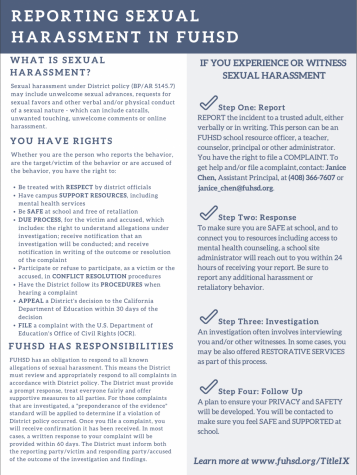
Gross adds that the district sometimes receives and utilizes social media screenshots to add context for certain situations, or in cases of cyber sexual bullying, provide “some level of evidence” for “exchanges that were inappropriate or pictures that were posted.”
All sexual assault or rape allegations are reported to the police, and after the police are contacted, the police and district carry out two separate, confidential investigations, and do not typically collaborate or communicate extensively about their respective investigations. Gross is in charge of the FUHSD investigations, and communicates about progress and next steps with all students, families and staff involved. Currently, Gross says there are two ongoing investigations at MVHS and the police have been contacted as well.
Gross explains that the district investigation is guided by Board policies and the California Education Code, whereas the police investigation is guided by legislature. If the police investigation results in a citation for the student (such as in the case of sexual battery), then the district will also implement consequences for the perpetrator.
“Sexual battery is an Ed Code violation, and if [the perpetrator is] proven to have engaged in that, and if it has a connection to school and it’s impacting the survivor’s ability to make progress in school, feel comfortable and safe, then there will be discipline,” Gross said. “In some cases, the far extent of that discipline could be recommendation for expulsion — there’s a hearing, there’s a whole process to determine that. Also sometimes, the incident that occured might not also be a crime, so then we would only be guided by the district’s internal investigation process, and then we have policies like the Sexual Harassment Policy which makes it very clear that a student would violate that policy if they had done things such as non-consensual touching. Part of what I do when I initially get a report is I gather the information that a site initially has, and make a decision about how I’m investigating and which policies I am using.”
If an investigation reveals that the perpetrator is guilty, the district implements corrective actions. One of these corrective actions could be a no-contact contract, which includes constraints regarding how people move about campus in order to limit contact. These actions may also include suspension or expulsion. In the case of expulsion, the district remains responsible for the expelled student’s education — they would go to a different program during the term of their expulsion, and after completing that term, they may consider attending a different high school within FUHSD.
“I have also changed schedules, changed classes,” Gross said. “One of the questions I’ve been asked recently is — how do you determine which corrective action goes to which issues? And it is kind of hard to say because they’re all very different, but I would say the bottom line is, the goal is that, if that policy has been broken, we need to create an environment for the survivor that provides them with the safe and healthy ability to be on their campus and participating in school without impact. The corrective actions are really connected to making sure that we can make that happen.”
Another concern that Gross has been hearing recently from students pertains to language present in FUHSD’s Title IX policies stating that “the complaint shall be initiated no longer than six months from the date that the alleged unlawful discrimination occurred, or six months from the date that the complainant first obtained knowledge of the facts of the alleged unlawful discrimination.”

Gross says she has investigated several cases that are older than six months, and explains that the language likely stems from required legislation but that the district does not follow it strictly. After hearing this concern from students, Gross reached out to one of the district attorneys who has expertise in Title IX legislation to have a conversation about it, and says she will be clarifying this with the community soon. If it turns out that the six month language needs to be kept in the policy because it is a legal requirement, Gross plans to make additions to the website explaining that even if an incident is older than six months, it should still be reported, “because the last thing I want is for people not to report” and “people are reporting things that are older than six months and we have investigated those.”
“I do feel like we have a very complete process in terms of how we handle these situations,” Gross said. “The thing for me is making sure that people know they can and should report. Sometimes what we hear is that the school or district is doing nothing. I think that some of that comes from the fact that there’s things people know, but they haven’t been reported so we can’t follow up on them — we can’t do anything if we don’t know about them. And it’s also having the students understand the reporting process, how we can provide support.”
GEP’s feedback compilation and subsequent conversation with Gross
After the recent surge in sexual misconduct allegations, GEP co-presidents Rachel Kim and Sachi Roy decided to use the GEP Instagram account as a way to reach the community. In order to receive a variety of different perspectives when it comes to improving the district’s Title IX reporting and information accessibility, GEP officers created a feedback form and posted about it on their Instagram account, and after receiving over 300 responses, rekindled their communication with Gross.
View this post on Instagram
In early April, Kim and Roy had a meeting with Gross where they addressed questions that many people had cited in the feedback form.
“I think one of the biggest problems that we wanted to address was the reporting procedure, just because, when a lot of survivors go into the reporting process, they have no idea what’s going on,” Kim said. “They don’t know what happens in certain scenarios, like if somebody has already graduated, if they’re 18, if there was alcohol or other substances involved, the six month limit reporting policy … people have no idea what to expect. So we’re working on a way to get that information out to people across the district and also create a more informed consent curriculum. And luckily, MVHS also has a lot of groups that really want to address the issues like the Equity Task Forces, the new group Athletes Against Assault and Leadership’s addressing this issue as well.”
Kim and Roy hosted a GEP Update Meeting during lunch on April 20 where they shared the information and clarifications they gained from their meeting with Gross. In the future, Kim and Roy plan to continue scheduling meetings with Gross and implement what they hope will be long-lasting, systemic changes in terms of “how the district supports people who choose to report.” Currently, GEP is working closely with the Student Equity Task Force to compile resources and work toward their common goal of having a more comprehensive consent curriculum. Many of these changes are currently still in the works.
“The district is very willing to cooperate with students and listen to student voices,” Kim said. “And I think that’s really important because sometimes, school districts aren’t always as cooperative and obviously, a student perspective is necessary to understand how the student body and district students actually feel about these issues. I think the biggest area for improvement could be making long term changes … I think it’s a lot harder to do, especially if you want to do it on a district-wide level — that’s a lot of other people you have to talk to as well and honestly, not something that’s really within our power as students. But we need to have something that continues on after the media attention has died down.”
Athletes Against Assault: The founding and goals
A group of female athletes at MVHS recently started the Athletes Against Assault group in order to address their goals of “ensuring a safe environment for all after school athletes, amplifying the voices of survivors and establishing a stigma-free community against sexual assault.” AAA is not affiliated with a singular sport, and a group of athletes were inspired to found it after discussing recent allegations and the prevalence of rape culture in athletics.
In late March, they created an Instagram account and launched a petition (it currently has 341 signatures) that states:
“We demand action:
- Have a curriculum taught to athletes and coaches at MV regarding sexual violence/harassment prevention
- A system that educates and provides consequences to any players who have encouraged the culture of sexual violence/harassment, that will be continuous in the years to come.
- The enforcement of the Athletic Code of Conduct ensuring that accusations are investigated.”
They launched their website on the same day, which is constantly being updated with information about their movement, as well as outside articles and resources.
Their first official meeting, which had approximately 30 attendees, including athletes from both MVHS as well as other FUHSD high schools, took place on March 31, where they went over their goals and asked for feedback about their petition, which was launched later that day.
One of AAA’s main goals is to have alleged perpetrators be temporarily suspended from practices and games while reports are being investigated in order to ensure all other athletes feel comfortable on the field. However, if temporary suspensions are enforced, the alleged perpetrator could sue the district.
Additionally on March 31, they spoke to Athletic Director Nick Bonacorsi, along with Clausnitzer and Gross, about creating and implementing a district-wide curriculum for athletes addressing rape culture and consent. Currently, there is an Athlete Code of Conduct that all athletes are required to sign; however, AAA believes that many people who have violated the Code (such as making derogatory statements while on the field) are not being held accountable. In addition, one of the AAA founders notes that the code has a system in place that doesn’t allow accusations to take place, which they are currently working with Bonacorsi and the district to clarify and fix.
“The conversation was around education, and what they’re looking to do is have this systemic, positive cultural change at Monta Vista around athletics,” Clausnitzer said. “It would include annual training for coaches and for the athletes, modelled after what [National Collegiate Athletic Association] NCAA does as an institution.”
AAA also organized a walkout on April 8, where approximately 60 athletes walked out and had a moment of silence for 9 minutes and 7 seconds to signify the 97% sexual harassment statistic. The walkout was intended to be a peaceful demonstration of solidarity, but after receiving some backlash and claims of it being performative, AAA posted clarification on its social media.
Moving forward, AAA continues to work closely with Bonacorsi and the district to implement their curriculum. Although planning is still tentative, AAA wants the curriculum to be a mandatory requirement for all athletes and coaches, and to be taught before the season begins and enforced throughout the season. Like the Athlete Code of Conduct, AAA wants an agreement to be signed after the curriculum is taught and before athletes start participating in their respective sports.
Clausnitzer says that the curriculum may be in place next year, during the 2021-22 athletic seasons, and AAA hopes that it will be a systemic change that will exist even after the founders graduate. To that end, AAA is making sure that students from all grades, including freshman, are involved in the movement so that they have three more years to ensure that this initiative pans out the way they anticipate.
The Student Equity Task Force’s plans for an upcoming SH/SA Advisory lesson
Junior Sanya Garg, who is a member of the Student Equity Task Force’s Advisory Committee, explains that after the feminism Advisory, the Task Force wanted to follow up with a #metoo focused lesson. In light of recent allegations, the Task Force is now attempting to compile resources and create an Advisory lesson on consent, which is tentatively scheduled for Wednesday, April 28.
Gould is involved in the Student Equity Task Force’s plans for its Advisory lesson and says that the ideal way to do this is for it to be a dialogue, rather than a lesson, in small groups with people they already feel comfortable with. However, due to logistical challenges and the hybrid model, it is challenging to have that model be the universal student experience — therefore, she and the Task Force members are working to create a compromise between encouraging this ideal environment, making sure people don’t get triggered and imparting essential information to all students. Currently, the tentative plan is to have the lesson be a video, with Gould and English teacher Vennessa Nava presenting slides of what Gould says should be the “black and white type information,” the strict rules pertaining to consent and what students should and should not be doing.
“One of the main things we’re trying to approach in the Advisory is consent education,” junior Riya Ranjan, who is part of the Advisory Committee, said. “We want a good framework of what consent is beyond just the tea video that we watched in our Biology classes [during Sex Ed.]. And [one] of the things that we’re running into while preparing for that is we want to make sure that students feel safe while engaging in these kinds of discussions because they can be triggering or just hard for people to process. So we’re trying to figure out a way to either bring in some sort of professional to help as we move forward or having teachers like Ms. Gould and Ms. Nava lead it because they’re very experienced and knowledgeable … they’ll make the students feel more comfortable going through this.”
Junior Viyata Ruta, who is part of the Task Force’s social media committee, says that she will be posting on its Instagram account after the Advisory so that students who may miss the lesson can still access information and resources. She says that not many people have reached out to the Task Force through its Instagram or email, but are rather talking to teachers and Gross. However, Ranjan says that the Task Force has become a point of reference for teachers, so teachers relay information to them. The Task Force has in the past and is currently collaborating with Clausnitzer, various FUHSD Board Members, GEP and Leadership.
Ranjan emphasizes that the Advisory lesson is just a starting point — she hopes that, in coming years, consent education is more comprehensive, “whether that means changing what exists in the Biology classes or even going beyond just having kids learn it in ninth grade.”
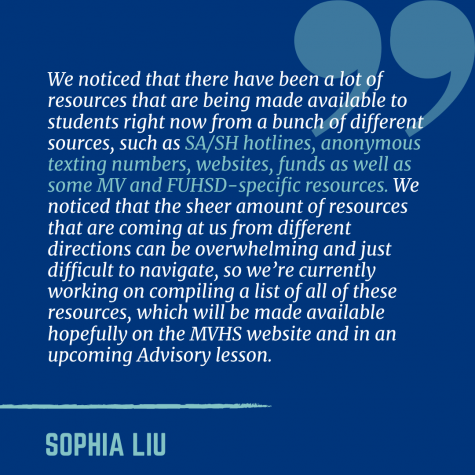
In addition to the Advisory lesson, junior Sophia Liu, who’s part of the Task Force’s External Outreach Committee, says that at a recent meeting, the Task Force discussed bringing in a professional to host a webinar where they would talk about how to cope and offer opportunities for 1:1 conversations with students. They also discussed potentially hosting a similar webinar for parents, but both these webinars are still in the works. Also, currently, Liu says the External Outreach Committee is trying to consolidate resources and create a document or a link tree.
“We noticed that there have been a lot of resources that are being made available to students right now from a bunch of different sources, such as SA/SH hotlines, anonymous texting numbers, websites, funds as well as some MV and FUHSD-specific resources,” Liu said. “We noticed that the sheer amount of resources that are coming at us from different directions can be overwhelming and just difficult to navigate, so we’re currently working on compiling a list of all of these resources that have been made available, which will be made available hopefully on the MVHS website and in an upcoming Advisory lesson, as soon as we get it done. And in the future, we’re going to be continuously updating this list of resources as well.”
Gould and Clausnitzer’s perspectives on providing immediate support and implementing systemic changes
When Gould first received information about the emerging allegations on social media and reports began coming to administration, she initiated a meeting where some staff members, including Clausnitzer, discussed how to proactively respond and have conversations.
“My main push in terms of the #metoo movement has been … we need to not only provide the opportunity for students to report cases of sexual assault and sexual harassment and follow through with timely and thorough Title IX investigations, which district leadership and administration have been doing an excellent job of doing,” Gould said. “But we also need to provide a lot of space for conversations, help students process emotions and provide a caring, supportive environment through which to make reports if that’s what students need to do, or just process and think and learn it, because there are so many students who are not in that position of actually having legal action to report but they’re still really, really impacted by the situation and overwhelmed by this new information that they’re learning.”
Gould says that they discussed how to address the situation as a staff and make students feel safe, how to further update the way Sex Ed. is taught and “provide opportunities for students to learn about things like positive and healthy relationships, how to express interest in people, how to think about what type of relationship you want to be in, and how to deal with manipulation and pressure, and all these things that come so far before we even get to these huge problems of sexual assault and sexual harassment.”
Gould emphasizes that it is necessary to create opportunities and spaces for everyone to engage in dialogue.
For instance, Gould shared the slides she was using in her Drama and Honors American Literature classes with the English department and offered them as a resource for people who may be looking for a starting point or guidelines to start conversations. Clausnitzer adds that he sent out an email to staff to help them come up with language they could use to talk to their students — like addressing the fact that students may have trouble focusing during this tough time — even if they chose to not use these slides.
“We talked about ‘How do we immediately think about support?’” Clausnitzer said. “Knowing that we don’t have a perfect process yet here at Monta Vista when things occur, in the context of truly having safe spaces. That’s something that we want to work on as a school so that when things do occur, whether they’re nationally, locally or just here at Monta Vista, we find a way to process as a school. We’re just not there yet, but we want to be there at some point in the near future.”
Additionally, along with English teacher Monica Jariwala, Gould talked to Clausnitzer and came up with the plan of open office hours where students could talk to any of the school’s guidance counselors to help them process.
Gould not only emphasizes the importance of conversations, but also the necessity of starting such discussions early on. Many students in the MVHS community have recently realized that they previously held misunderstandings about what classifies as sexual harassment. Gould points to early and comprehensive education as key to preventing such confusion.
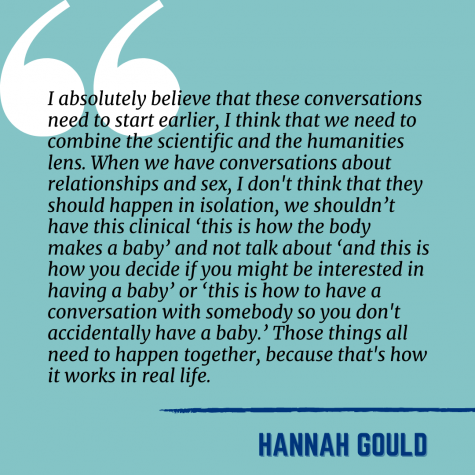
“I think, if anything, being younger provides a more fresh perspective on issues of sexual harassment and assault,” Gould said. “Being an adult who’s already kind of been socialized by society for so many years, often your teachers are several steps behind you. This movement has been really illuminating and insightful for me as well and it has given me the impetus to learn more about the boundaries and parameters of harassment and assault and think more critically about what I think relationships should look like, and what characteristics of a positive relationship are necessary. But I absolutely believe that these conversations need to start earlier, I think that we need to combine the scientific and the humanities lens. When we have conversations about relationships and sex, I don’t think that they should happen in isolation, we shouldn’t have this clinical ‘this is how the body makes a baby’ and not talk about ‘and this is how you decide if you might be interested in having a baby’ or ‘this is how to have a conversation with somebody so you don’t accidentally have a baby.’ Those things all need to happen together, because that’s how it works in real life.”
In terms of having comprehensive Sex Ed. starting as early as elementary school, Gould says that even kindergarteners should be introduced to these topics by asking them questions such as “what kind of touching do you enjoy?” or “do you like getting hugs and holding hands?” or asking them how it feels when someone pushes them. As students move on to higher grades, a new level of complexity should be added, and discussions should be “infused with the subjects that we already teach and talk about in ways that are relevant and have real life applications for students and that are interdisciplinary.”
In order to further her goal of making these conversations multifaceted, Gould reached out to the FUHSD curriculum leads — Greg Merrick is FUHSD’s English curriculum lead and Kavita Gupta is a science co-curriculum lead — to set up a meeting and talk about the possibility of “providing a science and English professional development opportunity for teachers to learn about ways that we could potentially collaborate on enhancing and expanding Sex Ed.” Gould anticipates that this potential systemic change will come with challenges because implementing district-wide reform is a slow and bureaucratic process.
“I don’t expect that we’re going to see changes at the district level, specifically with instruction in any kind of comprehensive way, anytime soon,” Gould said. “But even if it’s something where this year, we could get to the place where there are a couple of teachers on each campus who have ideas, and are incentivized to meet during collaboration time or during their prep periods. Like, this science teacher and this English teacher are going to collaborate on ideas for how they’re going to do this unit in their class, and it’s totally optional, and only three sections of kids are going to get it but, that’s better than nothing. Even if that starts to happen, I think it will be a good step in the right direction.”
Honors American Literature was doing the Feminist unit when conversations about sexual harassment and assault began to surface. Gould says that in recent years, the Honors teachers have been trying to make the curriculum less completely traditional academic and more responsive to student needs. This, as well as the fact that this conversation fit so perfectly with their unit, provided the opportunity for them to temporarily shift gears to talk about the #metoo movement for multiple class periods.
“Our first idea was to have one day on it,” Gould said. “And we did those first set of slides that were like, ‘How are you experiencing this moment? What do you want to change in the way that the school is handling it?’ And then it just became so obviously apparent that students were like — I’ve been using the term ‘starving for this information’ — like they haven’t had the opportunity to have these conversations. They don’t know what a positive relationship looks like, they don’t know how to talk about sex … they need information. At the end of every period, in the last 15 minutes, the chat just fills up with all these super important questions or comments that reveal a little bit of misunderstanding and I’m like, ‘Oh, my God, we need to talk about that.’ And then kids are like, ‘Wait, this isn’t the last day for this conversation, right? Like, we’re gonna keep talking about this, right?’”
Gould adds that education and more accessible information is critical, particularly more theoretical examples and information that help people classify their own experiences. Although much of what goes on during the reporting or investigating process happens on a case-by-case basis and depends on extenuating circumstances, Gould says that many students and adults on campus are currently working to make as much information as possible public and accessible.
In terms of reporting, Gould adds that even though destigmatization is necessary, it is up to every individual when it comes to whether or not they choose to report.
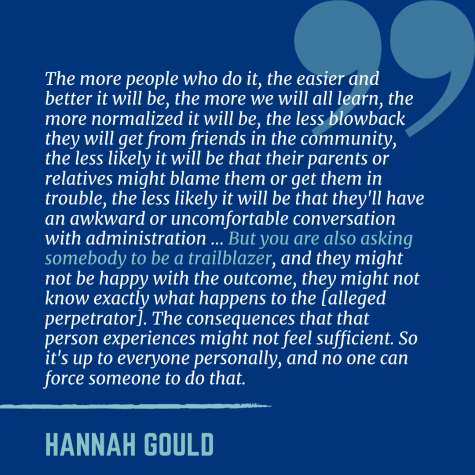
“It would be great if justice could be served and we could investigate all of these situations and help people,” Gould said. “But I think that reality is not so simple. And there are many reasons why people have negative experiences when they report information. The more people who do it, the easier and better it will be, the more we will all learn, the more normalized it will be, the less blowback they will get from friends in the community, the less likely it will be that their parents or relatives might blame them or get them in trouble, the less likely it will be that they’ll have an awkward or uncomfortable conversation with administration … we all need normalization and practice with these conversations, because it’s already happening, we know it’s happening. But you are also asking somebody to be a trailblazer, to put themselves on the front lines, and they might not be happy with the outcome, they might not know exactly what happens to the [alleged perpetrator]. The consequences that that person experiences might not feel sufficient. So it’s up to everyone personally, and no one can force someone to do that.”
In her classes, Gould and her students have been talking about what she refers to as “safe and brave spaces,” which she says people need to create in their friend groups and relationships. She says that if students experience a classroom conversation that they feel is a positive model, they can apply that to relationships in their own lives, whether that means supporting someone experiencing harassment, calling out people for making sexist jokes or practicing consent and respecting boundaries.
“[Conversations are] where the real work happens,” Gould said. “Teachers can set up the foundation for that, therapists can set up the foundation for that, but it means nothing if you can’t have those conversations with the people who are actually in your life. And the more individuals do it, they set the example for it, and the easier it will be for everyone around that. So that is this enormous act of courage, that would make a huge difference. That’s really the whole point of it.”


